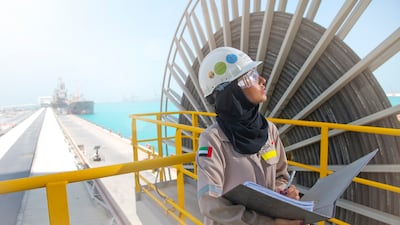Since the launch of the UAE’s National Strategy for the Empowerment of Emirati Women, we have made great strides forward. Today, the country has become a global leader in female empowerment.
One of the primary goals of this initiative – which also gave rise to the occasion of Emirati Women’s Day – was to make the UAE among the top 25 countries in the world for female empowerment. Six years later, it ranks 18th globally and first in the region, according to the UN Development Programme Gender Inequality Index.
Furthermore, government statistics from 2020 show that 77 per cent of Emirati women enroll in higher education after secondary school. And women comprise 70 per cent of all university graduates in the country. Perhaps most importantly for the future of our society, more than half of the government university graduates in the Stem fields (science, technology, engineering and mathematics) are women.
The vision of Sheikha Fatima bint Mubarak, Chairwoman of the General Women’s Union, President of the Supreme Council for Motherhood and Childhood, and Supreme Chairwoman of the Family Development Foundation, is undoubtedly coming to fruition.
Perhaps the greatest testament of this vision to empower Emirati women through education and employment to date is the Emirates Mars Mission. Eighty per cent of the science team behind the mission, which became the first in history to launch a probe from the Arab world into the Martian atmosphere, were women. And the Emirati woman who spearheaded the effort, Sara Al Amiri, Chairwoman of the UAE Space Agency and the UAE’s Minister of Advanced Technology, was named among Time magazine’s Next 100 most influential people in the world.
More and more Emirati women’s voices are being heard at the top echelons of business, enterprise and government on the global stage. Indeed, the UAE had the highest number of women – 23 - on the Forbes list of 100 most powerful Arab businesswomen in 2020.
But the UAE is never content to rest on its laurels. Especially when it comes to issues that are critical to national sustainable development, such as female empowerment.
Earlier this year, Sheikha Fatima, who is affectionately called the Mother of the Nation, launched the UAE National Action Plan for the implementation of UN Security Council Resolution 1325 on Women, Peace and Security. It is a first for a member state of the Gulf Co-operation Council, demonstrating the UAE’s relentless commitment to advancing the role of women, not just in peace and security, but in all aspects of life.
As our nation celebrates the 50th anniversary of its foundation, we must continue walking the path that has brought us this far, to a place where the UAE has earned its place among the most progressive countries in the world. But now we must look further ahead: to the next 50 years.
Just as they are vital to the UAE’s space programme, women must be integral to important industries of the future, such as renewable energy, to advance the process of sustainable development.
Globally, women still only account for one third of all employees in renewable energy, according to the International Renewable Energy Agency’s latest data. The UAE can, and must, be a leader and stay ahead of the global curve in this instance. By carrying the momentum of young girls studying Stem fields into renewables, we can unleash the economic potential of our young women and our nation.
Educating more girls is the first step to building the economy of the future. The next, and just-as-important step, is getting them into an industry that can affect positive change. To this end, we must explore ways of engaging the Emirati community, through collaborations between energy sector players and schools, so that our young women are immersed in a sector that can turn the tide against climate change. The aim is for them to begin building a legacy of positive change in the vital years ahead of what’s being described as the “decade of action”.
By taking these steps now, the UAE can amplify its impact on the global stage. Speaking at last year’s Global Women’s Forum in Dubai, International Monetary Fund managing director Kristalina Georgieva said that genuine gender equality could lead to more than $170 trillion in additional wealth. And our region, she said, is vital to realising this.
“If we were to bring the Middle East [on] par with the more advanced economies…over the next years, there would be $1 trillion more in output for everyone to share,” Ms Georgieva said.
We cannot afford to overlook the social and economic dividends of gender equality for the global economy. Imagine how that additional wealth could be used to fund research and development efforts into climate change and carbon capture technologies. How it could be used to accelerate a green hydrogen economy. How it could be deployed to achieve fair access to clean energy for all across the developed and developing world alike. Fortunately, the UAE is home to bold, courageous and ambitious young women who are already imagining how to make this a reality.

















